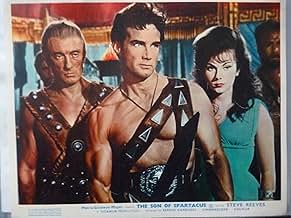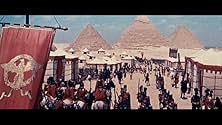During the power struggle between Caesar and Crassus, a Roman centurion, who is the lost son of Spartacus, is dispatched to Crassus' camp to observe his movements and keep Caesar informed.During the power struggle between Caesar and Crassus, a Roman centurion, who is the lost son of Spartacus, is dispatched to Crassus' camp to observe his movements and keep Caesar informed.During the power struggle between Caesar and Crassus, a Roman centurion, who is the lost son of Spartacus, is dispatched to Crassus' camp to observe his movements and keep Caesar informed.
Ahmed Ramzy
- Murdok - a Lybian Chief
- (as Ahmad Ramzi)
Abdulmuniem Abdulrahman
- Slave
- (uncredited)
Hussein Al-Meliguy
- Slave
- (uncredited)
Abdel Hameed Badawy
- Slave
- (uncredited)
Storyline
Did you know
- TriviaThis marked the final Italian sword and sandal/mythological muscleman movie to be made by Steve Reeves. He would make several "Sandokan" movies and a spaghetti western before retiring from the screen.
- GoofsThe story takes place during the triumvirate of Crassus, Caesar and Pompey (65-60 BC), but when Crassus talks with Verulus and Randus, with the Sphinx serving as background, it is plain that the monument has already lost its nose - a fact that would take place 1850 years later.
- Quotes
La schiava Seila: [to Randus] My friend, my life... is you - my love!
- Alternate versionsThe Italian theatrical version had a 101 minute running time, with minor censorship cuts for violence. The foreign versions, namely the UK (Son of Spartacus), the USA (The Slave), the German (Der Sohn des Spartakus), and the Finish, run over 102 minutes. Although unconfirmed, there are video versions in Italy and France cut to 97 or 95 minutes.
- ConnectionsFeatured in Cheezy Fantasy Trailers (2006)
Featured review
By 1970 Son of Spartacus (now out on DVD) found itself relegated to Saturday morning matinées, which is hardly surprising since Steve Reeves here seems to be getting twice as much combat duty as in most of the other Italian epics. So much so, one could hardly miss the kiddies re-enacting his many sword fights on the way home. Grown-ups too had something to admire, especially the eye-catching Ombretta Colli who conveniently gets shipwrecked with Reeves on a beach with her costume cut to shreds. This might prove an embarrassment to Miss Colli in later years when she went into Italian politics, no doubt hoping her voters would not remember her cheesecake days.
However, it is film music fans who have most to cheer, with a score derived from no less than three of the top Italian film composers. While Son of Spartacus was being filmed in Egypt during March and April of 1962, veteran maestro Carlo Innocenzi sadly died (on March 24). His stirring main title can still be heard in the M-G-M release, and it's an impressive full orchestral version of the slow execution march for Princess Elea in Goliath Against the Giants (1961). For the opening scenes M-G-M simply recycle Innocenzi's battle music from Goliath Against the Giants, but the opening narration is accompanied by the lovely "Glauco e Antonino" track from Lavagnino's Last Days of Pompeii (1959). For the rest of the score we get a mixture of new music by Piero Piccioni (a haunting desert tune and a rousing finale march when Reeves ultimately triumphs), plus some prior Piccioni material from Duel of the Titans (1961). The Italian language version (also available on DVD) is scored by Piccioni throughout, with a different main title adapted from "Amulio" in Duel of the Titans. Piccioni's entire score, including some unused cues, can be enjoyed on a CD thanks to those dedicated vault raiders at Digitmovies
However, it is film music fans who have most to cheer, with a score derived from no less than three of the top Italian film composers. While Son of Spartacus was being filmed in Egypt during March and April of 1962, veteran maestro Carlo Innocenzi sadly died (on March 24). His stirring main title can still be heard in the M-G-M release, and it's an impressive full orchestral version of the slow execution march for Princess Elea in Goliath Against the Giants (1961). For the opening scenes M-G-M simply recycle Innocenzi's battle music from Goliath Against the Giants, but the opening narration is accompanied by the lovely "Glauco e Antonino" track from Lavagnino's Last Days of Pompeii (1959). For the rest of the score we get a mixture of new music by Piero Piccioni (a haunting desert tune and a rousing finale march when Reeves ultimately triumphs), plus some prior Piccioni material from Duel of the Titans (1961). The Italian language version (also available on DVD) is scored by Piccioni throughout, with a different main title adapted from "Amulio" in Duel of the Titans. Piccioni's entire score, including some unused cues, can be enjoyed on a CD thanks to those dedicated vault raiders at Digitmovies
- How long is The Slave?Powered by Alexa
Details
- Release date
- Country of origin
- Language
- Also known as
- The Slave: The Son of Spartacus
- Filming locations
- Production companies
- See more company credits at IMDbPro
- Runtime1 hour 40 minutes
- Aspect ratio
- 2.35 : 1
Contribute to this page
Suggest an edit or add missing content































